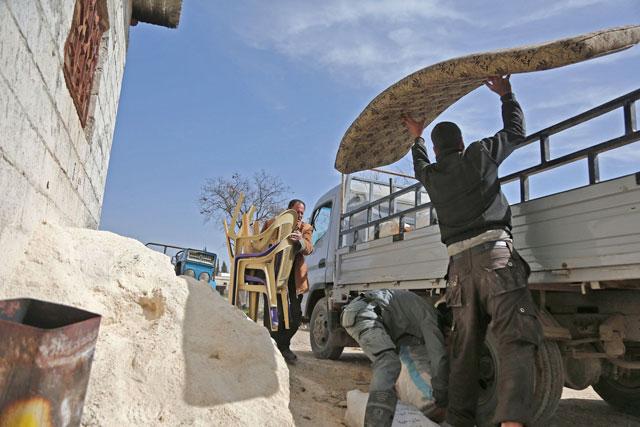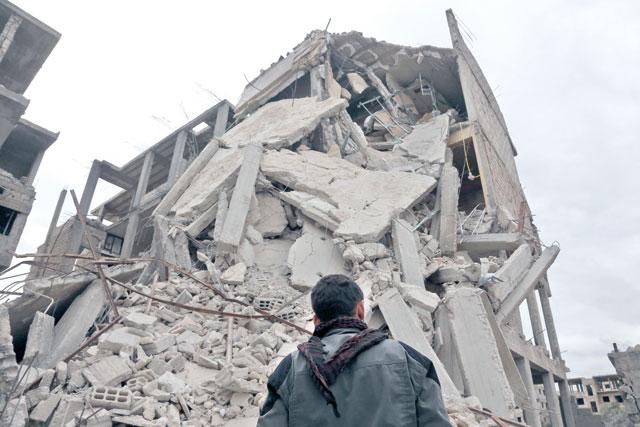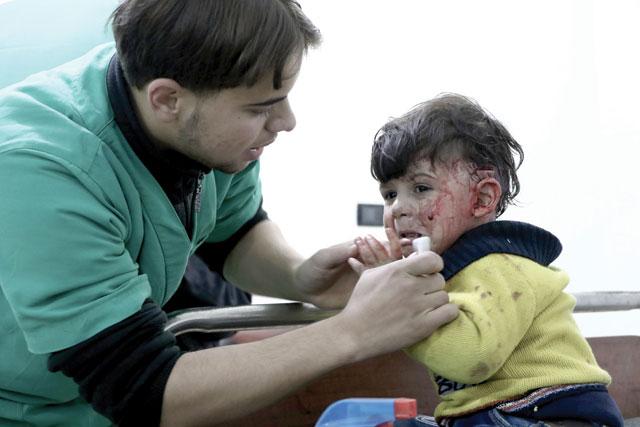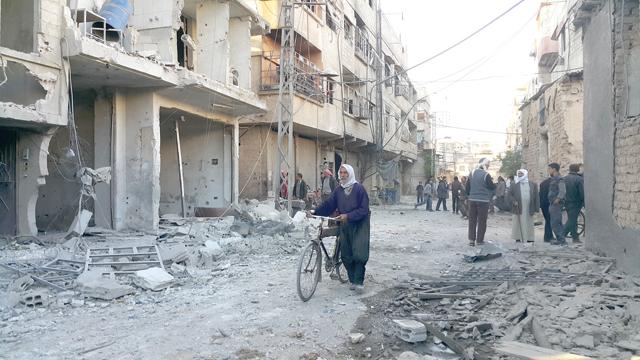You are here
UN says Russia’s Eastern Ghouta aid plan not enough
By Reuters - Mar 02,2018 - Last updated at Mar 02,2018

Syrians pack their belongings as they flee their home in the town of Utaya in the Syrian rebel enclave of Eastern Ghouta on Thursday (AFP photo)
GENEVA — A Russian plan for a five-hour pause in fighting in Syria’s Eastern Ghouta needs to be expanded to allow aid deliveries to enter and civilians and urgent medical cases to leave, United Nations officials said on Thursday.
In one of the fiercest onslaughts of Syria’s seven-year civil war, hundreds of people have died in 11 days of bombing of Eastern Ghouta, a swathe of towns and farms outside Damascus that is the last major rebel-controlled area near the capital.
The Syrian army and its allies launched ground assaults on the edge of Eastern Ghouta on Thursday, backed by a bombardment the Syrian Observatory for Human Rights said killed 11 people.
“You are failing to help us help civilians in Syria,” UN humanitarian adviser Jan Egeland told diplomats from 23 states attending a weekly meeting in Geneva.
“Eastern Ghouta is devoid of respect for international law.”
Some 400,000 people trapped in government-besieged eastern Ghouta need life-saving aid, and the only convoy allowed so far this year was a small one in mid-February with aid for just 7,200 people, Egeland said.
UN satellite analysis has shown significant damage across much of Eastern Ghouta since December 3, though the enclave has been subjected to regular bombardment throughout the conflict.
Russia, a strong ally of Syrian President Bashar Assad, has called for daily five-hour local ceasefires to establish what it calls a humanitarian corridor so aid can enter the enclave and civilians and wounded can leave.
But the first such truce on Tuesday quickly collapsed when bombing and shelling resumed after a short lull.
“We were not involved in the talks that led to the declaration of a five-hour pause. And if we had been we would say that it is not enough,” Egeland said.
Trucks on standby
Egeland said a “two-way” humanitarian corridor was needed, with several convoys each week into eastern Ghouta, while 1,000 priority medical cases must be evacuated for treatment.
“I have to say I know no humanitarian actor... who thinks the five hours is enough for us to be able to deliver relief into Eastern Ghouta and to organise orderly medical evacuations out,” he said of the Russian unilateral declaration.
Moscow, which says the rebel groups based in Eastern Ghouta are terrorists and not covered by the UN resolution, said they had stopped people leaving by attacking a safe route out of the enclave.
The rebel groups, which have said they would accept a full ceasefire, deny preventing civilians leaving the area.
They say people fear arrest or conscription despite Russia’s pledges that any who surrender to the Syrian government would be safe.
Assad’s other major ally, Iran, said it would continue to support his war effort. Tehran has deployed an alliance of Shiite militia in Syria since early in the conflict.
“The enemies cannot do a damn thing if we fulfil our duty,” Iran’s Supreme Leader Ayatollah Ali Khamenei was quoted by state television as saying.
“Iran will continue to support the Syrian government.”
Taskforce
During Thursday’s meeting of the humanitarian taskforce in Geneva, the United Nations received notice that it may get permission from Damascus to go to Douma in eastern Ghouta.
“We have 43 trucks standing by to go there and full warehouses to load into the trucks as soon as we get the permit,” Egeland said.
UN Syria envoy Staffan de Mistura told reporters the world body would not give up seeking a full 30-day ceasefire, as mandated by the UN Security Council last Saturday.
“We are determined because otherwise this becomes the copycat of Aleppo,” de Mistura said, referring to a battle for besieged rebel-held eastern Aleppo in late 2016.
Ghanem Tayara, chairman of the Union of Medical Care and Relief Organisations (UOSSM) working in Syria, said some 1,123 patients needed evacuation from eastern Ghouta, where two hospitals had been bombed since Saturday’s resolution.
“That means these people will die during the next few days if we don’t take them out. They need intensive care units. We don’t have them.”
Related Articles
BEIRUT/GENEVA — Syrian government forces launched a ground assault on the edge of the rebel-held Eastern Ghouta enclave on Wednesday, seekin
GENEVA — The United Nations called on world powers on Thursday to help arrange the medical evacuation of 500 people, including 167 children,
GENEVA — The UN called on Thursday for an urgent ceasefire in Syria's Eastern Ghouta region, near Damascus, to allow in desperately needed a

















